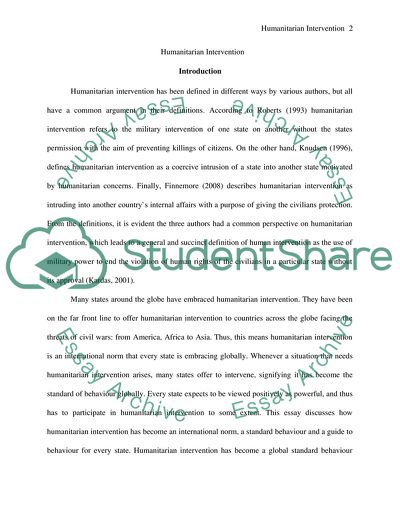Cite this document
(How Humanitarian Intervention Has Become an International Norm Coursework Example | Topics and Well Written Essays - 2250 words, n.d.)
How Humanitarian Intervention Has Become an International Norm Coursework Example | Topics and Well Written Essays - 2250 words. https://studentshare.org/politics/1865821-critically-discuss-the-following-statement-humanitarian-intervention-has-become-a-new-international-norm-a-new-standard-of-behaviour-and-a-new-guide-to-behaviour-for-every-state
How Humanitarian Intervention Has Become an International Norm Coursework Example | Topics and Well Written Essays - 2250 words. https://studentshare.org/politics/1865821-critically-discuss-the-following-statement-humanitarian-intervention-has-become-a-new-international-norm-a-new-standard-of-behaviour-and-a-new-guide-to-behaviour-for-every-state
(How Humanitarian Intervention Has Become an International Norm Coursework Example | Topics and Well Written Essays - 2250 Words)
How Humanitarian Intervention Has Become an International Norm Coursework Example | Topics and Well Written Essays - 2250 Words. https://studentshare.org/politics/1865821-critically-discuss-the-following-statement-humanitarian-intervention-has-become-a-new-international-norm-a-new-standard-of-behaviour-and-a-new-guide-to-behaviour-for-every-state.
How Humanitarian Intervention Has Become an International Norm Coursework Example | Topics and Well Written Essays - 2250 Words. https://studentshare.org/politics/1865821-critically-discuss-the-following-statement-humanitarian-intervention-has-become-a-new-international-norm-a-new-standard-of-behaviour-and-a-new-guide-to-behaviour-for-every-state.
“How Humanitarian Intervention Has Become an International Norm Coursework Example | Topics and Well Written Essays - 2250 Words”. https://studentshare.org/politics/1865821-critically-discuss-the-following-statement-humanitarian-intervention-has-become-a-new-international-norm-a-new-standard-of-behaviour-and-a-new-guide-to-behaviour-for-every-state.


